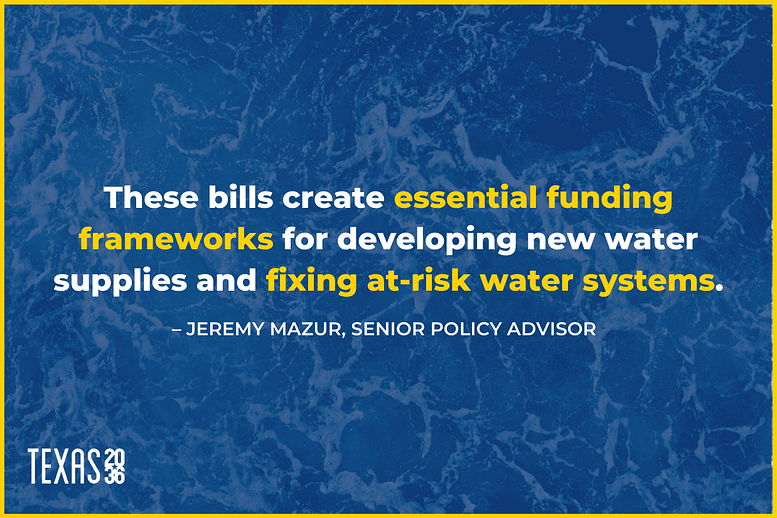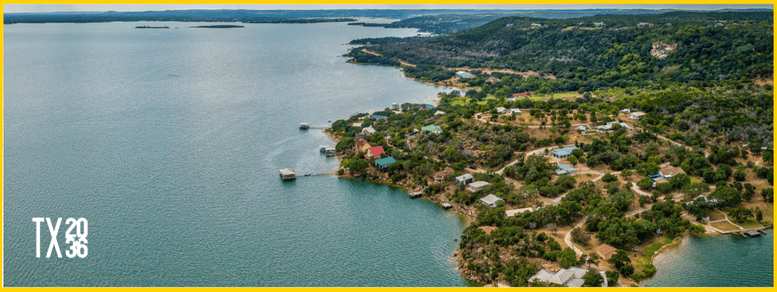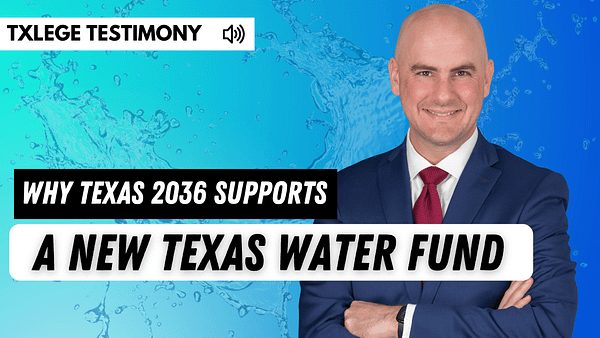Water legislation flows from Senate to House
This is a preview of our Texas 2036 newsletter about making prudent investments via legislation in the state’s water infrastructure. To receive this weekly highlight of our work, sign up here.
This week’s newsletter reports on the progress of signature legislation aimed at addressing Texas’ water crisis.
Surging support for water bills 🌊
Coming tomorrow: Senate Bill 28 and Senate Joint Resolution 75 — the legislative session’s signature water policy proposals — are on the agenda for the 8 a.m. meeting of the House Natural Resources Committee.
This historic legislation, which is aimed at putting Texas on track to develop the water resources needed to keep the state growing for the next 50 years and to maintain its status as a job-creating dynamo, passed the Senate on 31-0 votes earlier this month.

What you need to know about SB 28/SJR 75: 👩🎓
Why two pieces of legislation? Because lawmakers would like to create constitutionally dedicated funds to fix aging, leaky water systems and to create new water supplies, they must add language to the Texas Constitution authorizing these funds.
A Texas Two Step: The amendment must be approved by the voters in the November constitutional election.
- The last time that voters approved a major water funding amendment was in 2013.
What does it mean? Should lawmakers pass this legislative package, you’ll be hearing about water a lot more in the coming months as stakeholders spend money on awareness campaigns ahead of the November election.
- 😲 Did you know? The Texas Constitution, the state’s charter since 1876, has been amended 517 times!
Thinking about the future: Lawmakers are also discussing HJR 169, a separate constitutional amendment that would establish a dedicated funding source for the water funds.
- A roadmap for success: A dedicated source of funding has enabled long-term thinking when planning road projects across the state. It makes sense to take a similar approach to planning water projects, and Texas 2036 supports a permanent source of funding for improvements to the state’s water systems.

Why is it important? 🚰
- Between now and 2070, demand for water in Texas is forecasted to increase by roughly 9% while the state’s water supply is expected to decrease by 18%, according to a June 2022 report commissioned by Texas 2036.
- Texas water utilities lose at least 572,000 acre-feet of water per year due to leaky, aging pipes and other water infrastructure. That’s more than the amount of water present in a large surface reservoir like Lake Buchanan or Possum Kingdom Lake.

As the numbers demonstrate, the time is now for lawmakers to take action:
- These measures squarely address voters’ concerns. According to recent Texas 2036 polls:
- 89% of voters support spending some of this year’s historic state revenue surplus to aging, deteriorating systems.
- 82% of voters support using surplus funds to develop new water supplies.
What we’re watching: It’s all about the Benjamins 💵
The two chambers currently differ in how much money they would set aside for the funds.
The Senate: Appropriates $1 billion to the water funds.
The House: While the House has yet to approve its version of SB 28, House budget writers included $3 billion as a contingency to fund its version of the water legislation.
How does this story end? A conference committee would reconcile the different numbers should the chambers adopt different levels of funding for the legislation.
- 📺 Watch: Jeremy’s Senate committee testimony in favor of SB 28/SJR 75.

Water bills, water bills everywhere 💦
While SB 28/SJR 75 is the centerpiece water legislation this session, it is by no means the only piece of significant legislation. Here are a few other water bills we’re tracking:
- HB 4532/SB 2540 (Kacal/Zaffirini) – Establishes a process for water planners to identify how much they can pump from an aquifer without contributing to depletion.
- HB 1845/SB 650 (Metcalf/Perry) – Creates a certification pathway for entry-level water workforce jobs.
- HB 3232/SB 1406 (Rogers/Perry) – Removes regulatory disincentives for the regionalization of water and wastewater service.
- HB 5016/SB 2541 (Kitzman/Blanco) – Creates the Water Technical Assistance Consortium to facilitate the expansion of the state’s technical assistance provider capacity.
- HB 4623 (Goldman) – Authorizes regional water planning groups to identify opportunities to water markets when developing regional water plans.
- HB 1565/SB 1351 (Canales/Perry) – Provides for the continuation and improved function of the Texas Water Development Board and continuation of the State Water Implementation Fund for Texas Advisory Committee.

 How would you prioritize Texas’ water needs?
How would you prioritize Texas’ water needs?